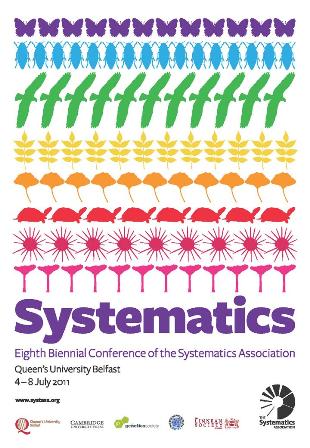Planarians to Parasitism: Stem Cells and Development in Flatworms

Planarians to Parasitism: Stem Cells and Development in Flatworms
Together with the Pearson Lab, and sponsorship from BMC Parasites & Vectors and The Systematics Association, we are pleased to announce a symposium that will be held during the 2012 Lisbon conference of the European Society for Evolutionary BIology, entitled “Planarians to Parasitism: Stem Cells and Development in Flatworms”.
The symposium aims to bring together workers on the developmental biology of free-living flatworms with those working on parasitic groups in order to foster greater synergy between these traditionally disparate research disciplines, i.e. developmental biology and parasitology. We are currently working on a book proposal for an edited volume to follow from the symposium, but including many additional contributors (watch this space!).
Organisers:
Peter D Olson (Natural History Museum, UK)
Bret Pearson (Hospital for Sick Kids, Canada)
Speakers:
Aziz Aboobaker (University of Nottingham, UK)
Klaus Brehm (Universitat Wurzburg, Germany)
Francesc Cebria (University of Barcelona, Spain)
Kyle Gurley (University of Pittsburgh, USA)
Peter Ladurner (University of Innsbruck, Austria)
James Collins (Howard Hughes Medical Institute, Canada)
New Book- Next Generation Systematics!
Next Generation Systematics: Studying Evolution & Diversity in an Era of Ubiquitous Genomics
James A. Cotton, Joseph Hughes and Peter D. Olson, Eds.
Contributors*:
David Bass, The Natural History Museum, London, UK
Richard Bateman, Royal Botanic Gardens at Kew, UK
Mark Blaxter, University of Edinburgh, UK
Richard Buggs, Queen Mary University of London, UK
David Fitzpatrick, National University of Ireland, Maynooth, Ireland
Karim Gharbi, University of Edinburgh, UK
Mehrdad Hajibabaei, Biodiversity Institute of Ontario, Canada
Simon Harris, Wellcome Trust Sanger Institute, UK
Joseph Hughes, University of Glasgow, UK
Thomas Keane, Wellcome Trust Sanger Institute, UK
Tim Littlewood, The Natural History Museum, UK
Peter Olson, The Natural History Museum, UK
Chris Quince, University of Glasgow, UK
Michael Sanderson, University of Arizona, USA
Ralph Sommer, Max Planc Institute, Germany
Dennis Stevenson, New York Botanic Gardens, USA
Graham Stone, University of Edinburgh, UK
Magdalena Zarowiecki, Wellcome Trust Sanger Insitute, UK
*and co-authors. N.B. The author list has not been finalised.
European Society for Evolutionary Developmental Biology, Lisbon 10-13 July 2012

Join us for the 3rd conference of the European Society for Evolutionary Developmental Biology!
For registration and further details, see here
PROGRAMME
Keynote Speakers
Per Ahlberg (Uppsala University, Sweden)
Moisés Mallo (Gulbenkian Institute of Science, Portugal)
Armin Moczek (Indiana University, Bloomington, U.S.A.)
Paula Rudall (Royal Botanic Gardens, Kew, U.K.)
Symposia (4 parallel sessions)
Towards a theory of development
Organizers: Alessandro Minelli (Univ. Of Padua, Italy), Rinaldo Bertossa (Groningen University, The Netherlands)
Evolution of organs and cell types
Organizers: Andreas Hejnol (SARS Bergen, Norway), Jean-Francois Brunet (IBENS, Paris, France)
Evolution of stem cells and regeneration
Organizers: Ram Reshef (Technion Univ. Israel), Uri Frank (NUI Galway, Ireland)
Next generation models to understand animal phylogeny and regulatory evolution
Organizers: Michel Vervoort (Institut Monod Paris, France), Florian Raible (University of Vienna, Austria)
Evolution at the Plant-Animal interface
Organizers: Beverley Glover and Sam Brockington (Univ. of Cambridge, UK)
Morphological misfits
Organizers: Paula Rudall (Royal Kew Gardens, UK, Ronald Jenner NHM London, UK)
Evo-Devo of homeotic transformations
Organizers: Andre Pires da Silva (University of Texas, USA), Frietson Galis (VU University, the Netherlands)
Evo-Devo of arthropod appendages: the genes that matter
Organizers: Patricia Beldade (Gulbenkian Institute, Portugal), Antonia Monteiro (Yale University, USA)
Evo-Devo in extreme environments
Organizers: Didier Casane (CNRS Paris, France), Sylvie Rétaux (CNRS Gif-sur-Yvette, France)
Planarians to parasitism: Development and stem cells in flatworms
Organizers Peter Olson (NHM London, UK), Bret Pearson (University of Toronto, Canada)
Posterior elongation in bilaterians
Organizers: Guillaume Balavoine (Institut Monod Paris, France), Ariel Chipman (Hebrew University, Israel)
Regulatory protein changes in the evolution of plant body plans
Organizers: Günter Theissen (Friedrich Schiller University, Germany)
Theoretical contributions to Evo-Devo
Organizers: Hans Metz (IASA Austria)
3D Imaging for EvoDevo
Organizers: Brian Metscher and Gerd Mueller (University of Vienna, Austria)
3D Morphometrics for EvoDevo
Organizer: Philipp Mitteroecker (University of Vienna, Austria)
Heterospory: The Evolutionary Road to the Seed
Organizers: Heather Sanders (University of Oxford, UK), Mike Frohlich (ENS de Lyon, France)
How do you like your eggs?
Organizers: Casper Breuker and Alistair McGregor (Oxford Brookes University, UK)
The origin and fate of germ cells in animal evolution and development
Organizers: Jeremy Lynch (University of Cologne, Germany), Evelyn Schwager (Harvard University, USA)
Evolution of sex determining pathways in insects
Organizers: Daniel Bopp (University of Zurich, Switzerland), Louis van de Zande (University of Groningen, the Netherlands), Lino Polito (University of Naples, Italy), Martin Beye (Heinrich Heine University, Germany)
Next Generation Systematics in Northern Ireland!

James Cotton, Joseph Hughes and Pete Olson have organised a symposium entitled “Next Generation Systematics: Studying Biodiversity in an Age of Ubiquitous Genomics” that will take place on Tuesday, July 5th, 2011, as part of the 8th Biennial meeting of the Systematics Association, held at Queen’s University, Belfast (organised by Juliet Brodie, James Cotton, Pete Olson and Christine Maggs).
A book proposal with the same title is currently in review with Cambridge University Press and is expected to be published as part of the Systematics Association Special Volume Series (ca. 2012).